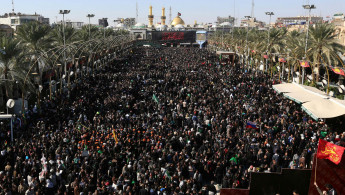Iraq prepares for biggest Shia-Muslim Arbaeen gathering in history
An unnamed Iraqi official announced that 1.9 million Iranians had already arrived in the country, ahead of the start of an important festival on 21 November.
According to the al-Khoei Foundation, an estimated 22 million pilgrims are expected to attend this year's pilgrimage. This is a 10 percent increase on last year, when 20 million pilgrims reached Karbala for the ceremony.
"Despite the serious threat of terrorism that prevails in Iraq at the moment, pilgrims are still flocking in their millions to visit Imam Hussein (AS) and nothing will keep them away," said Siddika Gulamhusein, a spokesperson for the al-Khoei Foundation.
There have been speculations this year that more pilgrims will attend Arbaeen in 2016 as a result of Iran's boycott of the pilgrimage to Hajj in September.
"No fatwa has ever been made about the substitution of the pilgrimage to the Imam Hussein shrine in Karbala for doing the Hajj rituals in Mecca," the Iranian embassy in Kuwait said before this year's Hajj.
In order to meet this year's increased demand, the Iraqi authorities have been preparing logistical arrangements for for over six weeks.
"Arbaeen requires a huge level of co-operation matching the size of the visit and the ministries of oil and transport have a big role to play in this success," said the governor of Karbala, Akeel al-Turaihi.
Speaking from the central control-room for this year's events, Turaihi mentioned that factions of the Shia militia umbrella - the Popular Mobilisation Forces (Hashd al-Shaabi in Arabic) - will be positioned around the city, possibly in defence against any attacks by Islamic State group militants.
Last year, IS fighters planted bombs inside baby dolls on the road to Karbala, hoping to target young children. An IS suicide bomber also killed nine people in a bomb attack on pilgrims in Baghdad.
Iraq's Transport Minister Kazem Finjan has spoken of his department's preparations ahead of one of the world's largest movements of people.
"We sent 300 double-decker buses and 100 single-floor buses to transport visitors into the city and 500 large trucks to take visitors out after the completion of the rituals," said Finjan.
The ministry has also organised onward travel for pilgrims after the procession, with more than 24 trains designated to transport passengers to Basra and another 12 trains to take visitors on to Baghdad.
Iraq's minister of transport aroused controversy earlier this year, after he said that ancient Sumerians had managed space travel 7,000 years ago, reaching Pluto.
Arbaeen is an annual pilgrimage to the Hussein mosque in Karbala. It commemorates the martyrdom of Hussein ibn Ali, the grandson of Mohammed, forty days after Ashura.
Shia Islamic tradition dictates that a mourning period should last for forty days.





 Follow the Middle East's top stories in English at The New Arab on Google News
Follow the Middle East's top stories in English at The New Arab on Google News


